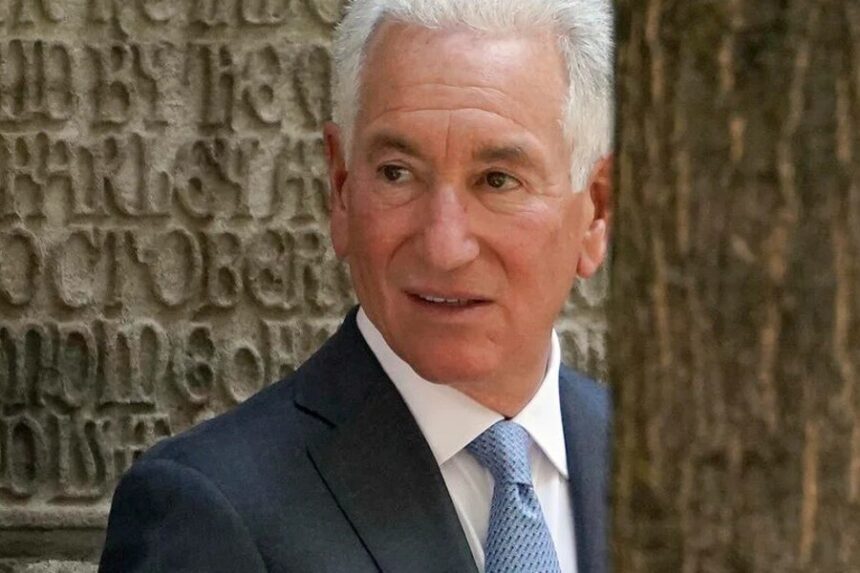France has summoned U.S. Ambassador Charles Kushner to the Quai d’Orsay on Monday after he sent a letter to President Emmanuel Macron alleging France has not done enough to combat antisemitism. In a statement issued Sunday, France’s Foreign Ministry rejected the assertions as “unacceptable,” said the government is “fully mobilized” against antisemitic acts, and warned that Kushner’s intervention crossed diplomatic red lines.
“France firmly rejects these allegations,” the ministry said, noting that the rise in antisemitic acts since Oct. 7, 2023, is “a reality we deeply regret and against which the French authorities are fully mobilized.” The ministry added that Kushner’s allegations “run counter to international law,” invoking the Vienna Convention’s principle of non-interference in states’ internal affairs, and said the remarks “fall short of the quality of the transatlantic partnership” and the trust expected between allies.
The contents of Kushner’s letter were not released. The White House and the U.S. State Department did not immediately comment. Summoning an ambassador is one of the strongest formal signals of displeasure a foreign ministry can deliver short of recalling its own envoy.
Kushner, a real-estate developer pardoned by President Trump at the end of his first term and the father of Trump’s son-in-law Jared Kushner, has served as Washington’s envoy in Paris during the current administration.
What prompted the clash
The dispute lands amid a sensitive debate in France and across Europe over how to confront a post–Oct. 7 spike in antisemitic incidents while also navigating polarizing arguments over Israel, Gaza, and recognition of Palestinian statehood. Just days earlier, Macron publicly rejected Israeli Prime Minister Benjamin Netanyahu’s claim that France’s stated readiness to recognize a Palestinian state is fueling antisemitism.
France is home to the largest Jewish community in Western Europe—about 500,000 people, roughly 1% of the population—heightening domestic stakes around community security, speech, and social cohesion. French officials insist they have tightened policing, prosecutions, and protection of religious sites since last fall while defending France’s sovereignty over how those policies are framed and communicated.
A fraught moment in U.S.–French ties
The summons also comes at a time when broader policy frictions are testing the alliance:
- Trade and tariffs: A decree signed last month by President Trump will subject international shipments under $800—previously exempt—to import duties starting Aug. 29. With practical guidance still unsettled, France will join other European postal services on Monday in suspending many parcels bound for the U.S., underscoring potential consumer and small-business disruption.
- U.N. peacekeeping in Lebanon: Paris and Washington are divided over the future of the UNIFIL mission. France has pushed back against a U.S. effort to wind down the operation; the Security Council is expected to vote at the end.
- Ukraine policy: Earlier splits on security assistance have eased after President Trump signaled support for certain security guarantees and held a warm meeting with Macron and other European leaders at the White House last week.
Against that backdrop, Paris views Kushner’s letter as an unnecessary escalation that complicates coordination on a crowded transatlantic agenda.
Why it matters
- Diplomatic norms: By citing the Vienna Convention’s non-interference principle, France is signaling that public or formal U.S. criticism of its domestic measures crosses a boundary—even when the topic is shared concern over antisemitism.
- Domestic sensitivities: Antisemitism is a high-salience issue in France, with security, free expression, and community relations intertwined. External pressure risks hardening political lines at home.
- Allied cohesion: The episode adds friction just as the allies are juggling trade changes, a sensitive UNIFIL decision, and war-related diplomacy in Europe and the Middle East.
What we don’t know
- The letter’s specifics: Neither side has published Kushner’s text. It’s unclear which French actions—or perceived inaction—were cited, or what remedies the ambassador urged.
- U.S. response: The State Department and the White House had not responded at the time of France’s announcement. Whether Washington will back the ambassador’s approach or soften it diplomatically remains to be seen.
What’s next
- Monday meeting: Kushner is expected at the Foreign Ministry, where French officials will register their protest and may seek clarifications or a corrective statement.
- Watch the UNIFIL vote: The end-of-month Security Council decision will test whether the two countries can compartmentalize this dispute and cooperate on Lebanon.
- Tariff fallout: With under-$800 parcels newly subject to duties from Aug. 29 and European postal suspensions beginning Monday, both governments face pressure to clarify rules and mitigate consumer impact.
Quick reader Q&A (user-intent)
What happened? France summoned the U.S. ambassador after he sent a letter accusing France of not doing enough against antisemitism. Paris called the claims “unacceptable” and a breach of diplomatic norms.
Is France denying that antisemitism has risen? No. France says antisemitic acts have increased since Oct. 7, 2023, and that authorities are “fully mobilized” to counter them.
Why is this a big deal diplomatically? Publicly challenging a host nation’s internal policies can be seen as interference. Summoning an ambassador is a formal rebuke that can strain wider cooperation.
How does this affect everyday people? In the near term, the tariff change on sub-$800 imports and related postal suspensions could disrupt cross-border shopping and small-business shipments between Europe and the U.S.
What should we watch for? Any U.S. statement following Kushner’s meeting, whether France discloses more details about the letter, the UNIFIL vote at the month’s end, and how the new U.S. import duties are implemented starting Aug. 29.




